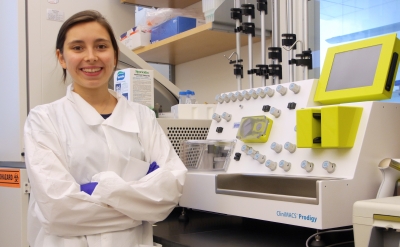 Elizabeth “Lizzie” Cheeseman, a chemical engineering student at Loughborough University in England, earned a coveted spot in the 2014 HSCI Internship Program by winning a UK-wide competition sponsored by the EPSRC Centre for Innovative Manufacturing in Regenerative Medicine. As her prize, Cheeseman spent ten weeks in the Center for Human Cell Therapy at Boston Children’s Hospital, where she worked with her mentors to develop a way to label lung stem cells using iron particles, which would allow the cells to be tracked with MRI scanners if infused in a patient with a disease like emphysema. She spoke with Stem Cell Lines about her summer experience:
Elizabeth “Lizzie” Cheeseman, a chemical engineering student at Loughborough University in England, earned a coveted spot in the 2014 HSCI Internship Program by winning a UK-wide competition sponsored by the EPSRC Centre for Innovative Manufacturing in Regenerative Medicine. As her prize, Cheeseman spent ten weeks in the Center for Human Cell Therapy at Boston Children’s Hospital, where she worked with her mentors to develop a way to label lung stem cells using iron particles, which would allow the cells to be tracked with MRI scanners if infused in a patient with a disease like emphysema. She spoke with Stem Cell Lines about her summer experience:
Q: As an engineering student, what inspired you to apply for a stem cell internship?
Cheeseman: I’ve had an interest in healthcare from a young age. My grandmother was diagnosed with renal failure when I was about ten, and my mom used to take me to the hospital with her. I met with all of my grandmother’s doctors and they would explain to me all the different tablets she had to take and why. I knew that I couldn’t go into medicine, however, because I was terribly squeamish. My grandmother developed diabetes as well, and when I used to help her take the blood tests I would have to sit down after seeing even the tiniest drop of blood. I ended up going into chemical engineering because it gave me other options to do healthcare. I was looking to do a semester-long project at the EPSRC and came across this internship, and it’s just gone from there.
Q: What was the most unexpected part of working in a biology lab?
Cheeseman : I’d say the clinical things were weird for me. The Center for Human Cell Therapy is a translational lab, and so they help different researchers and organizations get their drugs to be FDA-approved. They’d get, for example, mobilized peripheral blood— blood that has a lot of white blood cells—and then find techniques to improve how it’ s used in the clinic. The lab also gets things like corneas. I tried to watch one of my col - leagues do a dissection and I just felt the color drain out of me.
Q: Do you feel like the lab was a good match for you?
Cheeseman: The lab was the perfect match for me; not just in terms of the project that I worked on, but the overall goal of trying to translate basic research for the clinic. Even on my final day of the internship, the novelty never wore off. I was as excited to come into the lab as I was on the first day. I experienced some issues—ultimately my project yielded mixed results—but I enjoyed the challenge. Even if I had negative results, it’d still be a result. It’s almost as if there is no failure in science, because you’re continually adding to this breadth of knowledge. I just find it fascinating.
Q: Has using the scientific method made you a better engineer?
Cheeseman: I think so. It gives you a different approach to things—a more flexible view. Engineers tend to think in binary terms; it either is or it isn’t. Biologists are more comfortable dealing with gray areas and complexity, and so I tried to take some of that attitude back with me.
Q: What do you see yourself doing in the future?
Cheeseman: I’ve gone from not really knowing what I want to do for a career this time last year to being dead set on doing a PhD and some sort of research experience. I don’t know where it’s going to take me in the long term, but I know that I’ll love what I’m doing.
